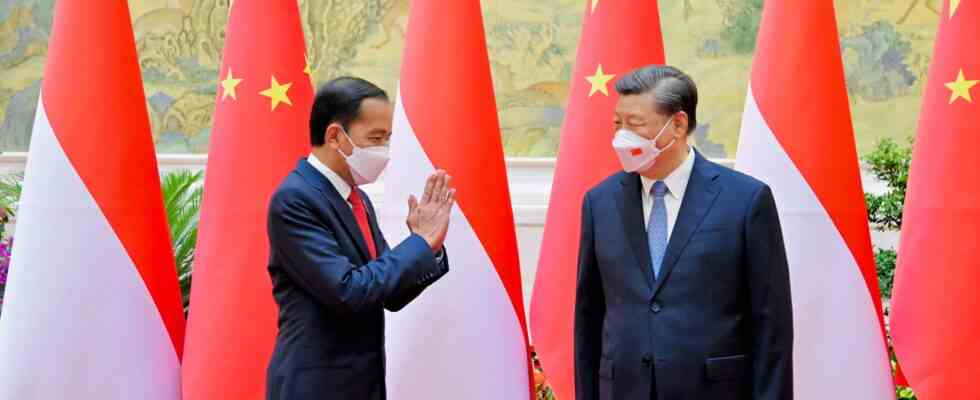Status: 08/11/2022 5:30 p.m
Indonesia and China had a difficult relationship – until the pandemic. Then vaccine deliveries and trade strengthened cohesion. Meanwhile, Indonesia is being courted in Beijing. Because China is also benefiting from it.
The fact that Xi Jinping receives foreign state guests in Beijing is an exception under China’s Corona regime this year. Indonesia’s head of state Joko Widodo was therefore able to interpret it as a special signal that Xi welcomed him to the Chinese capital at the end of June – as the first foreign guest since the end of the Winter Olympics in February.
Closer economic cooperation was agreed, and relations are to be deepened, especially in the areas of agriculture and food security. At least as important, however, was the message that came out of the meeting: According to Ian Chong, a political scientist at the National University of Singapore, with the meeting China demonstrated “a high regard” for Indonesia, but also its “independence from other strong economies”. . And Indonesia was recognized as an “important regional player”.
Dispute over an archipelago
Before the pandemic, China and Indonesia were a complicated, tense relationship. In late 2019 and early 2020, the two countries clashed over the Natuna Islands, a small group of islands in the South China Sea.
While China recognized that the islands belonged to Indonesia, it wanted to fish in the waters around the islands and asserted historical rights. Meanwhile, Indonesia referred to the fact that the islands belong to the archipelago.
The concern about raw material deposits also plays a role. The area is rich in mineral resources. The gas fields in the Natuna Sea are among the largest unexplored gas reserves in the world – and this made the islands economically attractive even before the energy crisis triggered by the war in Ukraine.
But especially during the pandemic, the two countries drew closer again. When the virus reached Indonesia, the government turned to China, which became the main supplier of Sinovac vaccines.
China needs raw materials
In any case, trade was unaffected by the political tensions: China is Indonesia’s most important trading partner. In the first half of 2022 alone, Indonesian exports to China increased by more than a third. China needs raw materials – nickel, coal, copper, natural gas and coconut oil. And Indonesia has them.
Leo Suryadinata, sinologist at the Yusof Ishak Institute (ISEAS) in Singapore, calls these developments a pragmatic relationship. China is looking for “new alliances in the region”, while Indonesia feels “seen” and supported by a major power.
Not all expectations of joint, prestigious projects are fulfilled. First of all, there is the planned high-speed line Jakarta-Bandung. Seven years ago, Widodo commissioned a Chinese company to build the $5.5 billion line. The construction should take an estimated five years and cut the travel time between the capital Jakarta and the popular city of Bandung from more than three hours to just 40 minutes over 142 kilometers.
Another success for China’s “New Silk Road” project, it was said at the time – and for Jakarta an improvement in infrastructure in the country and a sign that it is catching up on a technological level.
The construction site in Jakarta that will one day be the platform for the express train to Bandung.
Image: picture alliance / ZUMAPRESS.com
Upgrade to regional power
But no trains are rolling over the tracks yet. In Beijing, the heads of state have now committed to completing the route in 2023. Both are trying to maintain the image of a successful cooperation: “As an important showcase project, this cooperation must not fail,” says the sinologist Suryadinata. Because both sides saved their faces.
Even if conflicting interests remain: Indonesia can feel vindicated as a regional power. It is increasingly trying to fulfill this role – in the ASEAN state alliance and this year also as the host of the G20 summit in Bali. Symbolic images are part of it – especially when they are created in Beijing.

